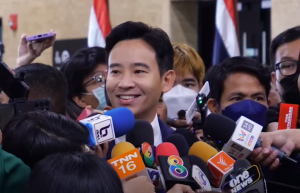On August 7, the Thailand Constitutional Court dissolved the 2023 electoral winner, the Move Forward Party. Its popular leader, Pita Limjaroenrat, and all party executives were banned from politics for 10 years.
On August 9, it was announced the remaining 143 MPs would form the People’s Party, with 37-year-old entrepreneur Natthaphong Ruengpanyawut as its leader.
However, Natthapong and 43 others may also face a lifetime ban from politics.
Move Forward was banned after the court ruled that it had undermined Thailand’s governance of democracy.
Before the 2023 national elections and in accordance with electoral law, the Move Forward Party submitted all its campaign policies to the Election Commission for approval, including one of its flagship policies, to amend Section 112, Thailand’s draconian lese majeste law. They received approval.
With the Move Forward Party having won at the polls, the Election Commission petitioned the Constitutional Court to review the controversial campaign policy on the grounds that it breached ethical conduct.
The Constitutional Court ruled that while pushing to amend Section 112 through the parliamentary process is legal, campaigning to amend the law is tantamount to “eroding and undermining and will lead to the overthrowing of Thailand’s governance of democracy with the king as the head of state” and that the action is “not far from the overthrowing of Thailand’s governance of democracy with the king as the head of state.”
Thus, according to the Constitutional Court, campaigning to amend Section 112 is an ethical breach; therefore, a party dissolution is warranted.
Natthapong and 43 members could be banned because they signed a petition to amend Section 112, an action that the National Anti-Corruption Commission is looking into following the Constitutional Court’s ruling.
Forty-four Move Forward MPs signed the petition to amend Section 112. These include Natthapong and popular politicians Sirikanya Tansakul, Rangsiman Rome, and Wiroj Lakkhanaadisorn, as well as former Move Forward leader Pita.
The National Anti-Corruption Commission is currently reviewing the action of signing the petition on grounds of “extreme ethical misconduct.” They will likely petition the Supreme Court to rule on the case. If found guilty, the punishment could be a lifetime ban from politics for all 44 MPs.
There is a precedent for the lifetime ban. In September 2023, the Supreme Court banned Pannika Wanich, former spokesperson of the dissolved Future Forward Party, the predecessor to the Move Forward Party, from politics for life. Her crime was posting a picture on social media deemed disrespectful to the monarchy 13 years ago.
The question remains, however, about what is the real reason for the banning and party dissolution.
The Constitutional Court, the Election Commission, and the National Anti-Corruption Commission in Thailand are considered “independent institutions” established to check and balance political parties, especially political corruption. The Senate is responsible for appointing the judges and executives of these institutions.
Following the military coup in 2014, General Prayut Chan-o-cha’s military junta appointed a new Senate, which then appointed the key members of these institutions. Thus, they became the instruments of the traditional establishment, which includes the military elites. This prevented reforms.
The ethical clause in Thailand’s constitution can be interpreted far and wide and is but it does not favor reformist politicians.
The media dubbed Future Forward, Move Forward and the People’s Party “reformist parties” for very good reasons. Their policies include amending Section 112 and reforming the military, civil bureaucracy, political infrastructure, economic infrastructure, and education system, to name but a few. The real reason behind the legal cases, therefore, is to prevent reform.
All roads lead to the 2027 national elections. The Move Forward Party won the 2023 national elections, but it couldn’t form a government. The second-place party, the Pheu Thai Party, then formed a coalition with conservative parties that represent the traditional establishment.
Subsequent polls over the past year have shown Move Forward and Pita leading all political parties and prime minister candidates by a wide margin. To prevent the reformists from sweeping the polls in the next national elections, the establishment must weaken them. Dissolving Move Forward will sideline its key politicians, especially the highly popular Pita.
Banning the 44 MPs means taking out other big-name politicians who are popular among the public. Continuous dissolution and banishment are meant to leave the People’s Party in the weakest state possible when the next national elections occur.
Furthermore, the aim is to deprive the people of hope for change, sending the message that the people’s vote can be defeated by the power that holds the law, that reforms will not be allowed in Thailand, and that Thailand will stay the same. It is a strategy to put off Thailand’s political awakening.
However, on August 7, at the headquarters of the now-dissolved Move Forward Party, supporters gathered around the politicians in an atmosphere of anger and disappointment but also of hope and persistence. Many wore black T-shirts emblazoned with the words “Shrug Shoulders and Move Forward.”
As the leaders took turns on the stage in front of the headquarters amid the cheering crowd, the message was loud and clear: “We will continue to fight.”
Originally published under Creative Commons by 360info™.

































